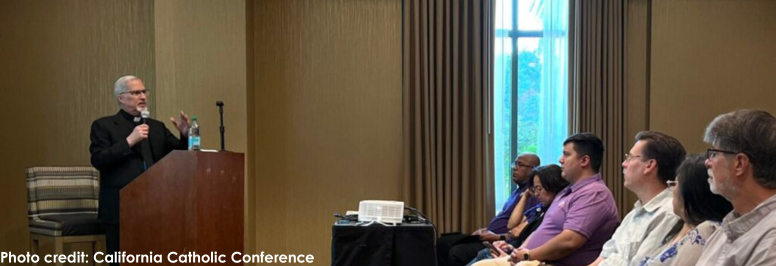By Natalie Romano
Shocked murmurs rippled across the conference room when artificial intelligence (AI) ethics expert Father Philip Larrey, Ph. D., revealed the truth…
Pope Leo XIV was a victim of AI-generated deep fakes, and the Instagram post they were looking at was one of them.
“There are hundreds…thousands,” said Fr. Larrey, professor of philosophy at Boston College. “...Pope Leo is now a huge public figure. The software is easy to use so they’re making stuff up.”
Fr. Larrey’s talk was part of a jam-packed 2025 Summer Leadership Summit hosted by the California Catholic Conference (CCC) June 3-5. The annual event, held in Sacramento, offers diocesan ministry directors’ professional development through lectures and workshops.
With illuminating yet sometimes alarming detail, Fr. Larrey laid out the potential impacts of AI on society and how the Church can influence those outcomes for the better.
In addition to his “day job,” the Mountain View native promotes AI that respects humanity and serves the common good, beliefs rooted in Catholic Social Teaching (CST). He does so by regularly engaging with Vatican scholars and industry leaders like Sam Altman of OpenAI and Demis Hassabis of DeepMind. He was the previous Chair of Logic and Epistemology at the Pontifical Lateran University in the Vatican and is the current Chairman of Humanity 2.0, an organization that focuses on improving life through global collaboration and ethical technology.
AI in simple terms, is the ability of machines to perform tasks that typically require human intelligence. In a few years, Fr. Larrey told the crowd, there will likely be an AI that “can do any cognitive task” that we can, the effects of which could be devastating; job loss for a staggering hundreds of millions of people and the devaluing of human life. Despite this, he says we shouldn’t ban AI.
“I think we need to teach people how to use it, use it in the right way, use it for good,” advised Fr. Larrey. “...We need to ask, does the AI enhance human dignity or is it a detriment? Are people still thinking critically? Are people free, deep down inside themselves?”
Wilfredo Aguirre, diocesan Director of Advocacy and Justice for Immigrants, says he’s troubled by the potential impact of massive job losses caused by AI.
“What might that look like in society; not just economically but also what that means for the human being,” said Aguirre, one of three from the diocese to attend the June gathering. “If I no longer have work, what is my purpose?’’
Fr. Larrey went on to discuss the most frightening potential of AI; the end of the human race, whether that be orchestrated by bad actors using AI to deploy bombs, biological warfare and the like, or by AI run amok. He acknowledged that these terrifying predictions lead people to ask if AI was created by the devil and to that he always says ‘no.’
“I do think it’s part of God’s plan in some way,” answered Fr. Larrey. “...I don’t think we should demonize it…I think we need to control it.”
Catholic educators in the audience are already grappling with issues related to AI, like students relying on the technology to do their homework or teachers using it to assess student progress.
“It’s very flashy, it’s very accessible,” noted Dr. Erin Barisano Ed. D., Superintendent of Catholic Schools, Diocese of Orange. “That’s why we need to ensure our teachers are not only informed but well formed. What sets us apart is our humanity- that’s what we have to always go back to. We shouldn’t have a reliance on AI, it’s a tool.”
Fr. Larrey was joined by Robert Nalewajek of Centesimus Annus Pro Pontifice, Inc. (CAPP-USA), a Vatican-affiliated organization that encourages Catholic values in public life. Nalewajek offered optimism about AI’s value in the fields of science and medicine.
“We can discover things quicker,” said Nalewajek. “The pharmaceutical industry and others are really diving in and the results on the human health market are going to be unbelievable.”
Isaac Cuevas from the Archdiocese of Los Angeles has personally benefitted from those medical advances. He wears smart glasses for macular degeneration, a condition that affects his vision.
However fascinating, Cuevas says we should not look at AI as a “novelty” but a responsibility.
“When you add this artificial element, thinking that it’s a way to replace human interaction or human thought or human emotions then we start to create a blurred line in reality,” said Cuevas, Director of Immigration and Public Affairs. “AI doesn’t understand that human life is valuable…That’s very scary.”
So how do we prevent the worst from happening?
Both speakers have faith in the Catholic Church as well as Pope Leo XIV who, with purpose, chose his name after the pontiff who cautioned about technological advances during the Industrial Revolution. The current pope wasted no time discussing how this new revolution of AI requires us to defend “human dignity, justice and labor.”
“It was quite shocking…just days after being elected pope, that he would talk about artificial intelligence,” said Fr. Larrey. “...As long as we don’t have a universal consensus about the use of AI, the pope’s voice is a powerful one because he’s not coming from a legal perspective but a moral perspective...Pope Leo needs to rally the people that are working in the field.”
At the end of the lecture, Kathleen Domingo, Executive Director of the CCC, told attendees to take some time to reflect on what they learned.
“[We need] to figure out how does this impact my ministry…what does this say to me about the way that I’m answering God’s call,” said Domingo. “This might be the first conversation you’ve been a part of around AI and the Church’s response, but it certainly won’t be the last.”
Natalie Romano is an award-winning freelance writer based in Southern California.
